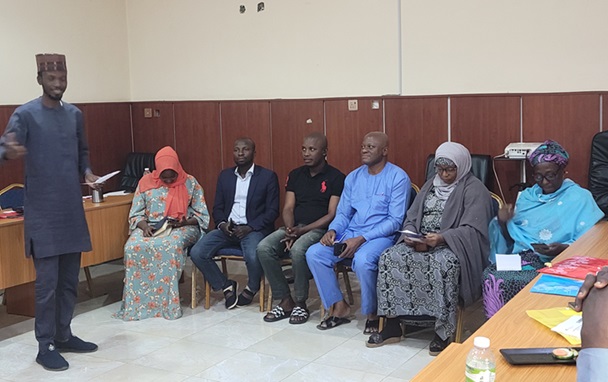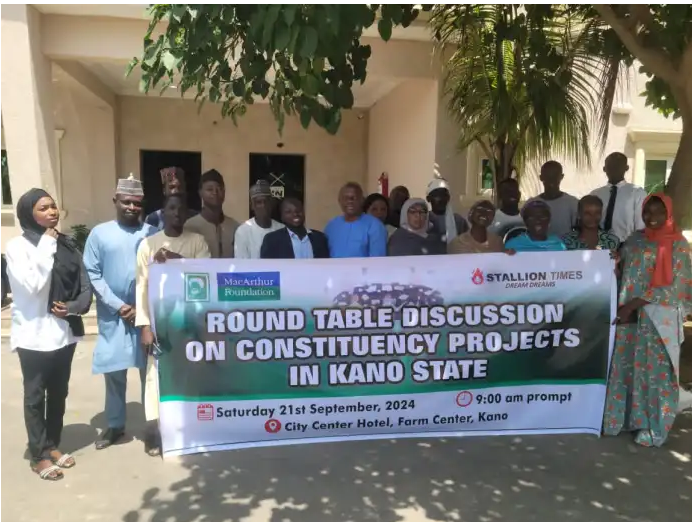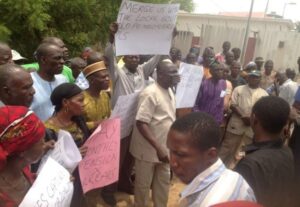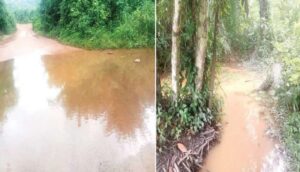At a round table discussion on constituency projects in Kano State on Saturday, some stakeholders called for a stable federal and state legal framework on constituency projects.
This is one of the resolutions in a communique mutually agreed upon and signed by the National Vice President, JNI Aid Group, Amb. Maria Alikote, Content Creator, KASKEN Kano, Sa’adatu Ibrahim Alhassan, Secretary, HASKEN Kano, Suleiman Ismail, Senior Correspondent, Arewa Agenda, Ozumi Abdul, the Executive Director Interfaith Peace Foundation, Rakiya Abba Tahula, Senior Correspondent, Grassroots Parrot, Saheed Abida Jomoh and the Coordinator of the Network for Empowerment & Development Initiatives, Peter Hassan Tijani.
The round-table which was organised by Stallion Times at City Center Hotel is one of many activities of the three-year participatory governance and media literacy project, tagged “Get Involved, Dialogue, and Improve (G-DRIP),” aimed at encouraging effective citizen participation in governance to enhance service delivery.
G-DRIP is supported by the Wole Soyinka Center for Investigative Journalism under the Collaborative Media Project and funded by the MacArthur Foundation.
According to the communique, Kano state has no legal framework to guide the identification and implementation of constituency projects to specifications.
It added that there is an absence of gender-based projects and non-involvement of constituents in identifying and implementing the constituency projects.

Other resolutions on the communique include;
“Create awareness by organising townhall meetings, media engagements, public policy dialogue, round-table discussions, advocacy, and citizens-led legislative engagement to educate the public on constituency projects and indicate how lack of their participation in tracking and monitoring breeds corrupt practices in the implementation of constituency projects.
“More women should be involved in the identification and implementation of constituency projects i.e. needs and interests of men, women, youth, People with Disabilities (PwDs) and the aged should be considered.
“Develop constituency projects tracking & monitoring template with a detailed action plan and a Monitoring and Evaluation framework.
“Establish constituency projects tracking and monitoring committee/network/forum at community levels to ensure timely execution of Constituency Projects to specification.
“Ensure citizens are educated to know their rights, expectations, and obligations in promoting transparency and accountability in implementing constituency projects.
“Increase community awareness of go-to portals (www.kanotracker.com and www.tracka.ng) and repositories of information on constituency projects and other reporting channels for infractions or feedback to concerned MDAs.
“Citizens must take an interest in public sector budgeting, budget tracking, and legislative advocacy including policy engagement.
“Promote community ownership of constituency projects through access to details of constituency projects such as budget amount, contractors, budget releases, scope of project.
“Engage the legislators to have constituency offices and designated time for interacting with constituents.”
The round-table which emphasised the importance of citizens’ engagement in planning and initiating constituency projects in Kano State had Civil Society Organisations (CSOs), Faith-Based Organisations (FBOs), Persons with Disabilities (PWDs), Community leaders, Academia, Kano State Open Government Partnership (OGP), state and non-actors, and the media.




